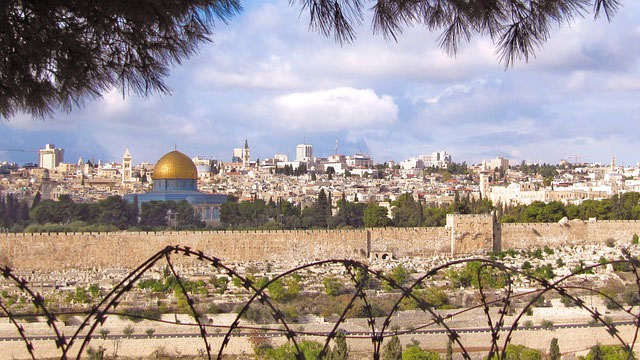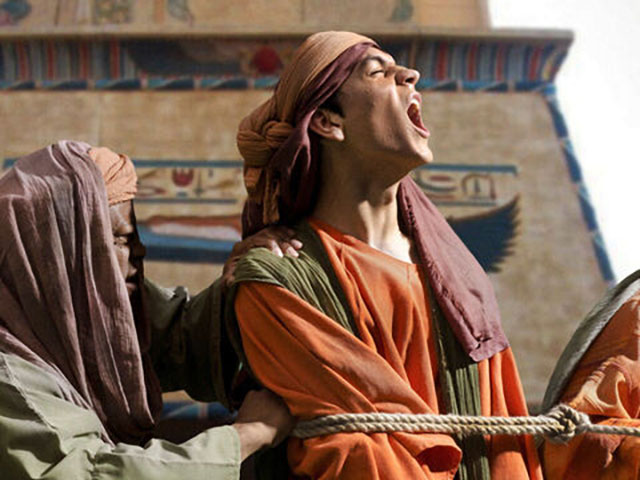Click above to watch video.
OR
Click below to play audio and read along.
Hello, my “Walking with Jesus” friends,
When you hear the word “RECKONING” I wonder what images come to your mind? Perhaps a mother with a wooden spoon and her little boy draped over her knee? Or maybe a courtroom with a judge declaring “guilty as charged” and the gavel coming down with a vengeance?
For the past three days we’ve been considering God’s warnings through His prophet Jeremiah to the Jewish people of Jerusalem who were embracing wickedness and turning away from God in the years following King Josiah’s death. Josiah was the final God honoring King in Jerusalem. Josiah was followed on the throne by not one but two of his sons, both of whom were wicked men and they turned Jerusalem into an idol worshiping, decadent city!
Jeremiah 25 contains another powerful message from God through Jeremiah to His people in Jerusalem, and it was followed by God’s action! “The word of the LORD came to Jeremiah in the fourth year of Jehoiakim, son of Josiah, king of Judah, which was the first year of King Nebuchadnezzar of Babylon…’though the LORD has sent all His servants the prophets to you again and again you have not listened or paid any attention… Therefore, the LORD Almighty says this: ‘Because you have not listened to My words, I will summon all the peoples of the north and My servant Nebuchadnezzar king of Babylon, and I will bring them against this land and its inhabitants...” (Jer. 25:1-11)
Did you notice God called King Nebuchadnezzar His servant? Does that trouble you? Nebuchadnezzar was a violent, wicked man who had no interest in the God of Israel. But God used Nebuchadnezzar and the Babylonian army to bring the discipline He had warned the people of Judah and Jerusalem about for so many years, through Jeremiah and others of His prophets…
The year was 605bc. Nebuchadnezzar and his Babylonian army had been fighting in Carchemish, way up north in modern day Turkey, about 500 miles north of Jerusalem. There, Nebuchadnezzar defeated both the remaining remnants of the Assyrian empire and Pharaoh Necho of Egypt! On his return to Babylon, victorious Nebuchadnezzar marched his armies through cities and towns covering almost 1000 miles, declaring the entire region to be under Babylonian authority. Jerusalem, as the capital of Judah, was one of those key cities. Nebuchadnezzar paused long enough in Jerusalem to declare his dominion over the Jewish people by doing three things…
* First, demanding allegiance from Josiah’s son King Jehoiakim and exacting a significant annual tribute payment in silver and gold.
* Second, amazed by the beauty of the Temple of God in Jerusalem, King Nebuchadnezzar ransacked it, taking for himself many of the golden artifacts of worship, perhaps the Altar of Incense, the Table of Shewbread and maybe the golden lampstands.
* Third, as was his custom, King Nebuchadnezzar took as prisoners of war, all of the princes of the royal family and others of nobility in Jerusalem and dragged them off to Babylon. Among them was a young Jewish teenager named Daniel!

Daniel records this historic event in this way: “… Nebuchadnezzar king of Babylon came to Jerusalem and besieged it. And the LORD delivered Jehoiakim king of Judah into his hands, along with some of the articles from the temple of God. These he carried off to the temple of his god in Babylon…” (Daniel 1:1,2)
While Nebuchadnezzar allowed Jewish king Jehoiakim, son of King Josiah, to remain in his palace in Jerusalem, Jerusalem was no longer a free city and Jehoiakim’s local authority would only be as Nebuchadnezzar permitted. By taking as captive the royal princes and nobility, Nebuchadnezzar was assuring that young Jewish generations would have no leadership or hope of a future apart from submission to Babylon.
Nebuchadnezzar was a strategist. As he conquered nations, he made sure he brought some of their young leadership to Babylon for training in submission to his authority. If they proved trustworthy, they would be placed in leadership over their countrymen who were enslaved in Babylon. If they proved rebellious, they were killed without mercy. Such was the environment into which young, Jewish Daniel was taken as captive in the great city of Babylon.
For the next few days we’ll follow the story of Daniel, to see what he was experiencing and what God was doing as He disciplined His rebellious people in Jerusalem. Upon arrival in Babylon Daniel was herded together with “…some of the Israelites from the royal family and the nobility – young men without any physical defect, handsome, showing aptitude for every kind of learning, well informed, quick to understand, and qualified to serve in the king’s palace….” (Daniel 1:3-5)
Quickly Daniel learned his fate: he was enrolled in a three-year, intensive, Babylonian leadership training program. He would be taught the language, history, culture, literature and religion of the Babylonians. The faster he learned, the more quickly life could become relatively comfortable as a leader of captives. If, however, Daniel rebelled, it would mean either hard labor as a slave or death.

For Daniel and his fellow Jewish captives, in an effort to remove from them any allegiance to their Jewish God; or any connection with their family ancestry; or any hopes of ever returning to Jerusalem; they were given new Babylonian names and most likely castrated, to become eunuchs.
Now don’t rush past that statement my friends. Sit here a moment and put yourself in young Daniel’s clothes. He was born and raised in Jerusalem during the glory years of King Josiah. While Daniel had seen the wickedness of his Jewish countrymen, he was a young man passionate for the honor and glory of the God of Abraham, Isaac and Jacob and likely Daniel looked forward to the day that he would have some leadership role in Jerusalem, determined to lead Jerusalem back to being a God honoring, glorious city as in the days of Kings Josiah or Hezekiah or Jehoshaphat or maybe even Solomon or David!
In his record, Daniel introduces us to three Jewish young friends from Jerusalem who were fellow captives. The change of all their names was strategic and significant:
To Daniel which meant ‘God is my judge’, was given the name ‘Belteshazzar’, meaning ‘Bel, protect his life’. Bel was another name for ‘Marduk’ the chief Babylonian idol god.
To Hananiah, which meant ‘the LORD shows grace’, was given the name ‘Shadrach’, meaning ‘allegiance to Aku’. Aku was the Babylonian moon god.
To Mishael, which meant ‘who is like God?’, was given the name ‘Meshach’ which probably meant, ‘who is like Aku?’
And to Azariah, which meant ‘the LORD helps’, was given the name ‘Abednego’ which meant ‘servant of Nebu’. Nebu was the Babylonian god of learning and wisdom.
My “Walking with Jesus” friends, let’s pause right here and put ourselves in the horrible, painful situation of these four, young Jewish men. Do these words describe their situation: Hopeless; Despair; Bondage; Fear; Worry? And what have you done in your lifetime when you found yourself in such situations? Let’s reflect on that with this worship song and I’ll meet you back here tomorrow with these four young men.
Bible images provided with attribution to www.LumoProject.com.
Have a comment or question about today’s chapter? I’m ready to hear from you, contact me here.

Pastor Doug Anderson
“Let us run with perseverance the race marked out for us, with our eyes fixed on Jesus…” (Heb. 12:1,2)
Archived back issues of “Walking with Jesus” and other resources are available by clicking here to open our ‘home page’ (or go to HOME at upper right of this page).
Share with friends. Subscribe below for daily “Walking with Jesus”.


